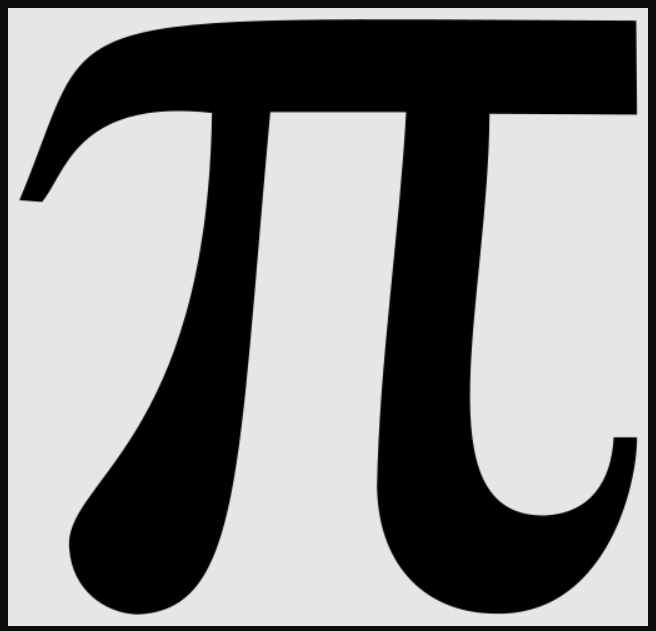
A Story of Pi
As a student of mathematics, there seldom is a mathematical constant full of exciting truths about the world than pi. Pi is the ratio between the circumference of a perfect circle and its diameter. Pi as simple as it states, has a very peculiar nature to it, it is never-ending, never-repeating, an endless span of the numbers playing about in this beautiful playground known as pi. As a result of this, you can actually find every single person's (or alien's if they uses decimal numerical system) banking password. They are somewhere encoded in the infinitude of pi. Pi is a story of human ingenuity and creativity and a very strong case of perseverance. Pi's story is still unfolding, I will try to my utmost ability to showcase pi, in eyes of a mathematics enthusiast.
If you're up for some soul-searching research, go research on pi, it tells you a lot about the world, at least the world of mathematics, the platonic, unrealistic, perfection, pursue of the impeccable proves and theorems. For any mathematician, the attraction towards pi is simple, it's freaking everywhere. Although I stated earlier, pi is just some ratio of a perfect circle (which doesn't exist anywhere in real life by the way), pi is present in the equations that describes the mechanics of the ultra-small (string theory and quantum mechanics), pi can be found in the complex world of statistics and probability, even some hypothetical crashing of a block against a wall in perfect collision without any lose of energy. As Grant Sanderson of 3Blue1Brown said, "anyone who has a soul would want to know why pi is here!", and I do indeed have a soul and some free time to explore, the mind boggling world of mathematics, pi for today.
Before Sir Isaac Newton, the digits of pi is calculated using a time-consuming way, slicing the polygons into ever smaller slices and calculate the individual distances, by which setting the bounds of pi. For some hundreds of years, mathematicians toiled over minutest of details and mountains of calculations in order to reach just another digit place of accuracy. However, when Newton came into the game, he changed the game, both for mathematics and physics, he adored infinite series, sequences, and wanted to know whether or not there was a faster way of calculating the sequences (the 'limit' of sequences for the mathematical minds out there). After a plague epidemic, he discovered or should I say, invented the arch nemesis of all mathematics student, depending which level of mathematics you are currently struggling over... CALCULUS. Although there was a lot of speculations over the assumptions at which calculus applies to generality of mathematics, due to its unreasonable effectiveness, both in mathematics and physics, it's just accepted as so (many of the fundamentals of mathematics are still up for grabs, maybe you could settle some and win some prices along the way). The computation was made much simpler, since Newton, we can nudge infinity as a concept to play with.
Mathematics is at its very core, a creative endeavor, so creative, that we can't even visualize it's complexity. We can certainly model it, but if you zoom close enough, the granularities, irregularities would be exposed, mathematics although vast, incomplete, messy, fun, its a tremendous fun to do. Yes, maybe those assignments of computing integrals are at the very core, useless to your life in general, but so is Harry Porter, Lord of the Rings, Ghibli Films... Mathematics is a fiction of mind, it's just surprising that it can be used in so much of modern life, without we even noticing it. Online transactions tied with prime numbers factorization, cryptography lies deep in the revolution of digital computers (and cybersecurity), physics is nothing without rigorous mathematical theorems to back up... all of science to be exact. The best part of learning mathematics is that it's an endless field, different proves for the same theorem, conjectures from previous proves might revolutionize our own understanding of certain criteria of the Universe's existence (a highly mathematical one in its essence).
Just as one watches Harry Porter never expecting to create 'magic', the same applies to mathematics, yes, it might be pointless now, but it's impact will far outlast our own fragile life and live on to spark another revolution in the far future. To cement this point, about hundred years ago, equations written down in a notebook of Indian mathematician, Srinivasa Ramanujan, now is being used in the active research of the Universe's craziest object - Black hole. Maybe it's exactly as what Ramanujan said to English mathematician, G. H. Hardy when being asked where did all his complex formulae came from... from GOD. As Galileo Galilei puts it best, "The laws of nature are written by the Hand of God in the language of mathematics." Our job, then is to read the 'mind' of God through mathematics. Thanks for reading!